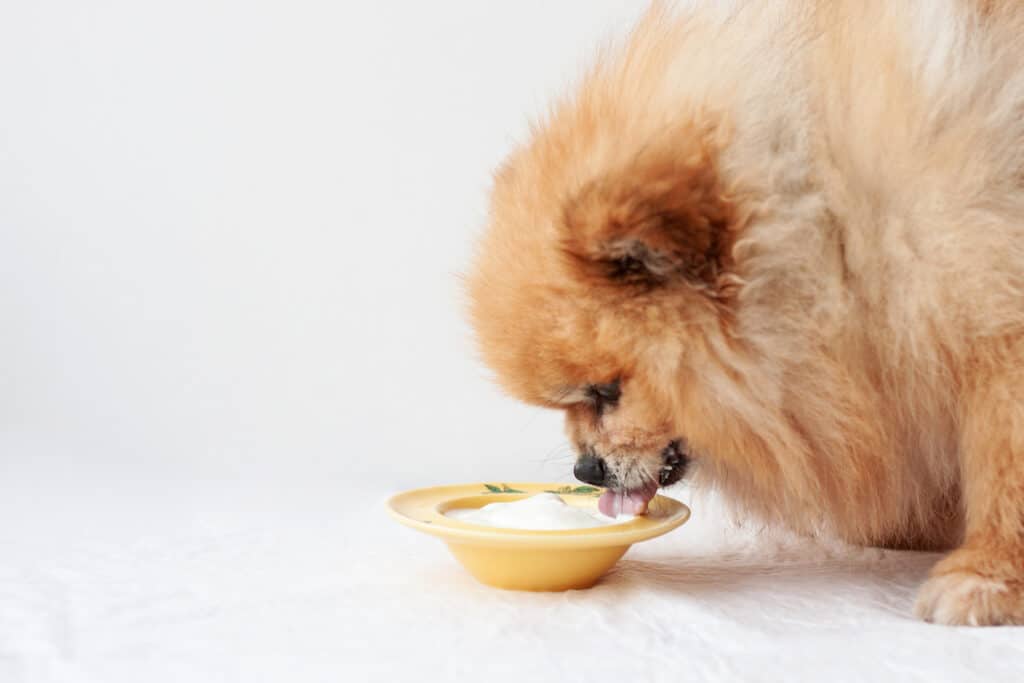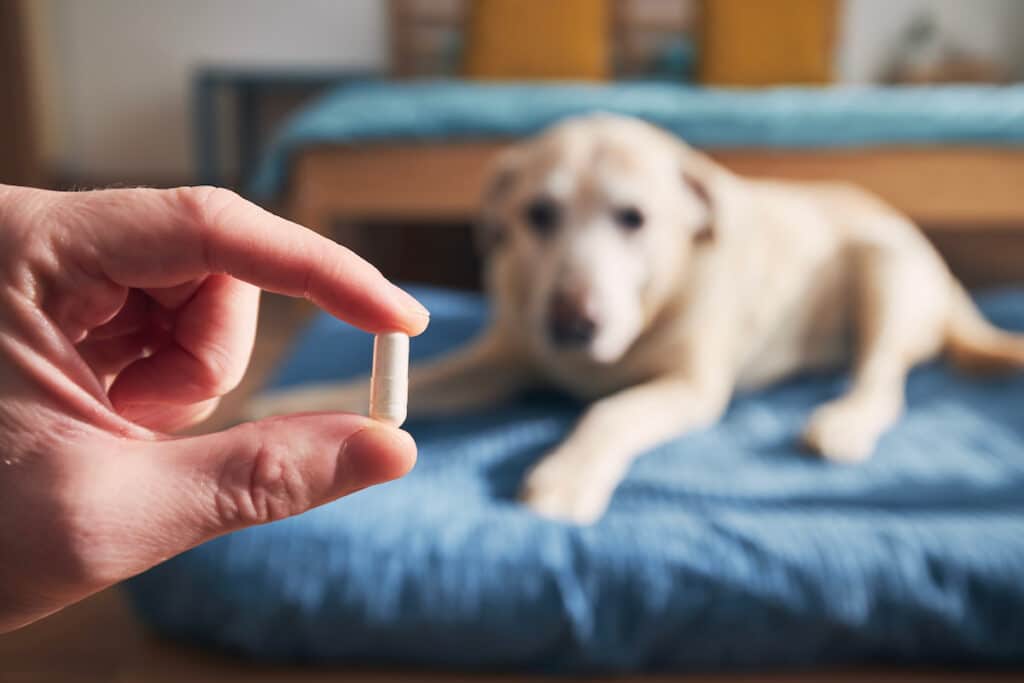When I think about natural probiotics for dogs, I think about yogurt. Yogurt that is made for humans is one of the best sources of probiotic-rich foods. In recent years, we’ve heard so much about how they improve our gut health.
It’s not only the human gut health that might need improvement. Your dog’s might need a boost, too. It’s one of the reasons that when giving my dogs Sadie and Oscar a treat, it will often include a heaping spoonful of plain Greek yogurt. They lap it up, literally.
Read on to find out how you can easily incorporate natural probiotics into your dog’s diet and overall life.

Understanding natural probiotics
Probiotics are live microorganisms, primarily bacteria and yeast, which confer health benefits to the host — in this case, dogs — when administered in adequate amounts.
They are often referred to as good or friendly bacteria as they help balance the gut microbiome.
Probiotics are identified by genus, species, subspecies and then strain. While there are hundreds of strains, the most common probiotics found in both food and supplements roll up into these four genera:
- Lactobacillus
- Bifidobacterium
- Streptococcus
- Saccharomyces boulardii
For example, when I look at the container of Greek yogurt I give my dogs — it is Chobani plain Greek yogurt — I see at least one of those natural probiotics, called active cultures, listed as being in there.

Benefits of probiotics for dogs
There are plenty of reasons you may want to take probiotics or give them to your dogs. One, you may be looking to help maintain the natural balance of microorganisms in the intestines.
Two, by giving them probiotics, you’re providing a natural way to lower their gut pH. This makes it less hospitable for and susceptible to harmful bacteria. And finally, by enhancing gut health, you’re likely strengthening their immune system.
Improved digestion and nutrient absorption
Probiotics promote a balanced gut microbiome, which is essential for optimal digestion. They aid in breaking down food and absorbing nutrients efficiently. Probiotics can also alleviate symptoms of digestive disorders, such as diarrhea and constipation.
In fact, when our first dog, Buffy got older, his stomach became much more sensitive to everything. So, every morning I gave Buffy a Florastor probiotic capsule.
Originally, I’d purchased Florastor — at the suggestion of my daughters’ pediatrician — to prevent them from getting yeast infections while on antibiotics for ear infections. When I asked Buffy’s vet if it was ok to give to him, he wholeheartedly agreed it would be a good idea, since dog’s nutritional needs change as they age.
Strengthened immune system
Like humans, a significant portion of a dog’s immune system is housed in the gut, making gut health crucial for immunity. Probiotics support the immune system by enhancing the gut barrier and promoting the growth of beneficial bacteria. They also help in the production of natural antibodies and the activation of immune cells to fight off pathogens.
The good news is you don’t have to give your dogs human probiotics. I mean, you can if you want to. Just clear it with your vet first.
But my point is this: there are probiotics available just for dogs. That’s what Eleanor Anne of Chaos Plants gives to her pups.
“I’ve been using Amazon’s brand of probiotics for my dogs, and the results have been remarkable,” she says. “They’re in the form of a chew, which they absolutely adore. They’ve significantly improved my dog’s digestive issues. The difference is clear-cut when I’m using them compared to when I’m not.”
This product is called Wag Probiotic Supplement Chews for Dogs, and it is way cheaper than Florastor. I’m definitely going to check it out for my dogs Sadie and Oscar.
The best probiotic products available for dogs
Probiotics for dogs are available in various forms, including supplements, fortified dog foods and natural food sources. If you make your own homemade raw dog food recipe, you can easily add naturally probiotic-rich foods to your dog’s diet.
While we make our own dog food for Sadie and Oscar, we don’t give them raw food. We cook chicken, peas and carrots in our Instant Pot, and then serve it with rice. Plus, as I mentioned, we give them a regular serving of Greek yogurt, too.
However, if we wanted to give them natural probiotic supplements, you can buy them in powder form to sprinkle on their food, or as capsules or chews. Fortified dog foods often contain added probiotics to support digestive health as part of a balanced diet.
Natural sources of probiotics for dogs include yogurt, kefir and fermented vegetables, though these should be given in moderation and with caution to avoid any adverse reactions. Yeah, I’m not sure I would give my pups fermented veggies without running it by my vet first.
Combining probiotic-rich foods with foods high in prebiotics, such as jicama, is a great way to cover all your dog’s bases when it comes to gut health.
FYI, prebiotics have nothing to do with live cultures like probiotics do. Instead, prebiotics is a fancy way of describing high-fiber food that’s good for you, such as brown rice or vegetables.
How to choose the best probiotic for your dog

When selecting a probiotic supplement or food, consider the specific strains of bacteria included and their proven benefits. Look for products that have been clinically tested and proven to be effective for dogs. Consult with a veterinarian to determine the most appropriate probiotic for your dog’s needs, especially if they have any existing health conditions.
Incorporating probiotics into your dog’s diet
Probiotics for dogs can be beneficial at any stage of your furry friend’s life, from puppies to seniors and for any breed, from the most active to the laziest. They are especially helpful during times of stress or illness or, as I mentioned earlier in relation to my daughters, after taking antibiotics, which can disrupt the gut flora.
Turns out I’m not alone in doing this. So does Ali Garland Travel Made Simple.
“We have a Yorkie, and we’ve given her probiotics many times,” she says. “We live in Berlin, so with a high density of dogs and random germs, it’s too easy for her to get sick, and the probiotics seem to help. “If she ever has to take antibiotics for something, we give her probiotics, too.”
Probiotics can also be used as a preventive measure to support overall health. Common signs that your dog may benefit from added probiotics include:
- Digestive issues such as diarrhea, constipation or irregular bowel movements.
- Frequent skin infections or allergies.
- Weakened immune system, which can manifest as frequent illnesses or infections.
Start by introducing probiotics gradually to avoid digestive upset. Monitor your dog’s response and be aware of any adverse reactions. Provide a balanced diet rich in fiber along with probiotics to support the growth of beneficial bacteria. Ensure your dog has access to clean, fresh water at all times, and be consistent with the administration of probiotics to see the full benefits.
The future of probiotics for canines
While science has come a remarkably long way in the field of probiotics over recent years, there is still plenty of room for advancement to utilize probiotics in the overall health and well-being of dogs. Ongoing studies and research are continuously unveiling new strains of probiotics and their specific benefits for canine health. The development of targeted probiotics to address specific health conditions is a growing area of interest.
Probiotics are powerful allies in supporting the overall health and well-being of dogs. From improving digestion and nutrient absorption to strengthening the immune system and potentially relieving allergies and skin conditions, the benefits of these beneficial microorganisms are vast and diverse.
By incorporating probiotics into dogs’ diets and consulting with veterinarians for personalized guidance, the full potential of these good bacteria can be unlocked to provide the best possible foundation for a healthy, happy canine life.
This article originally appeared on Food Drink Life.

